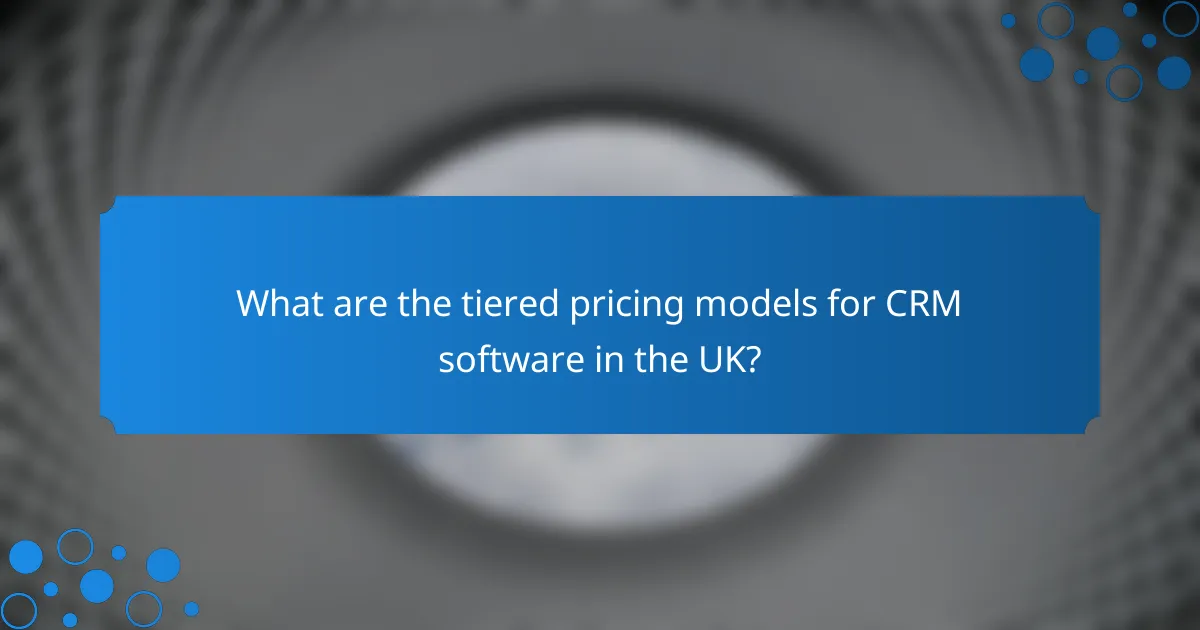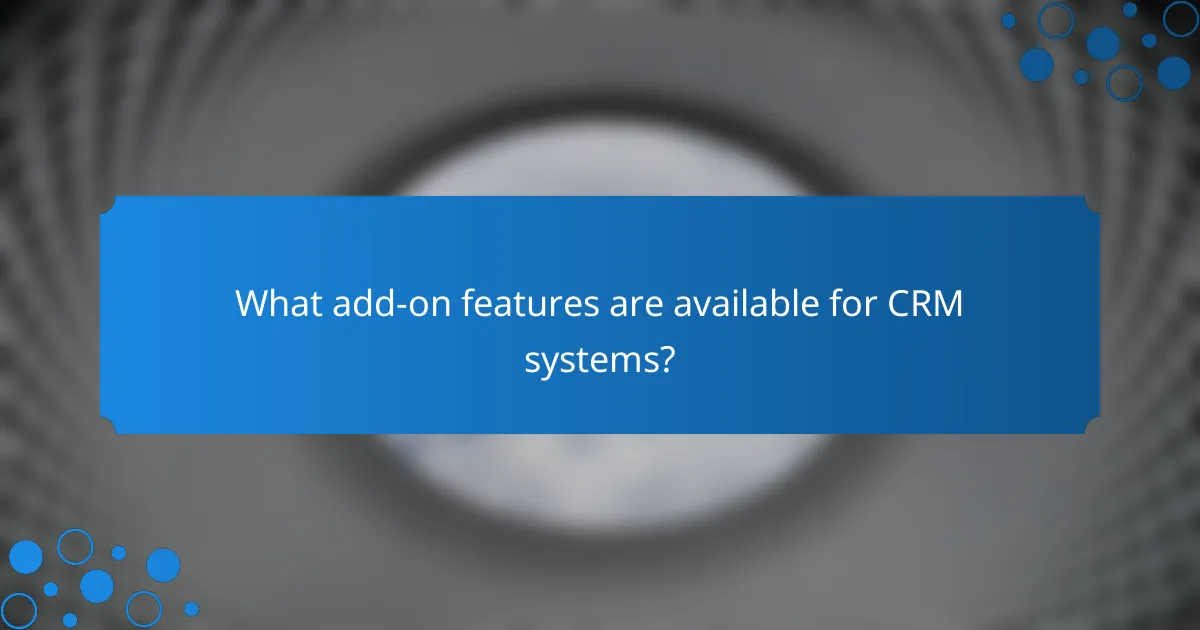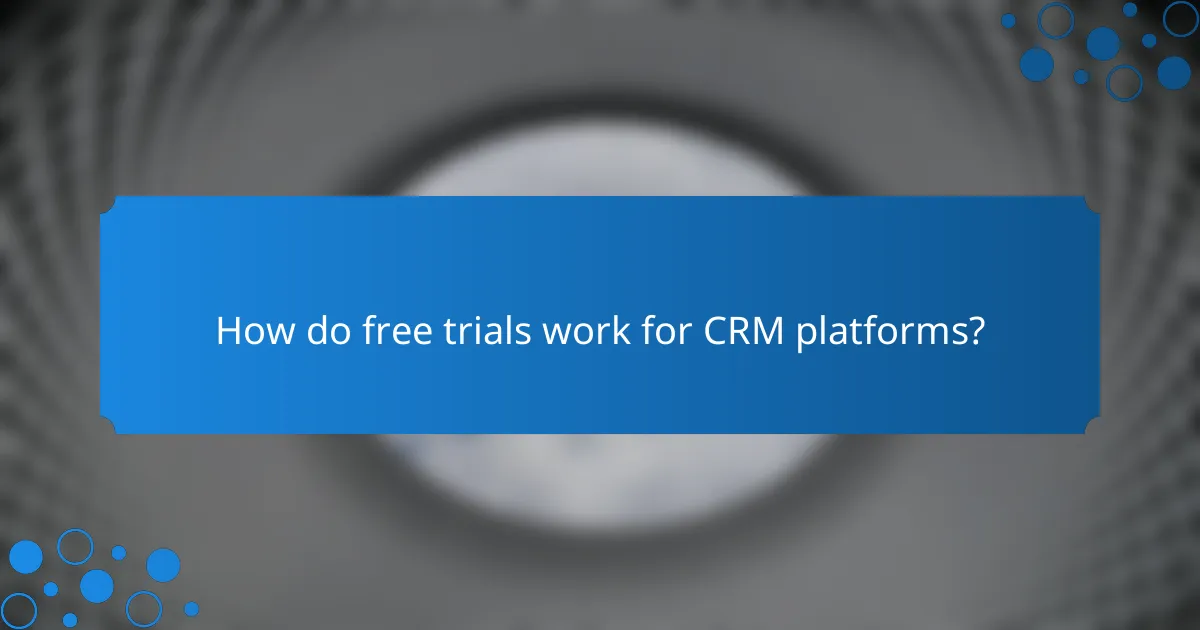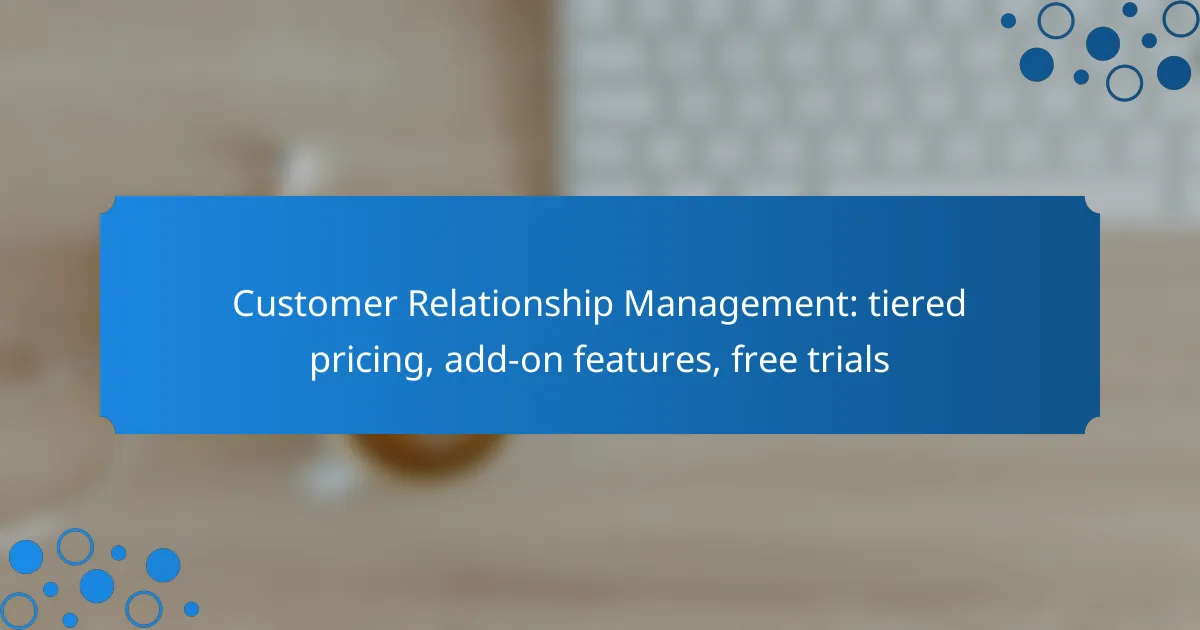Customer Relationship Management (CRM) systems utilize tiered pricing models to cater to businesses of varying sizes and requirements, offering plans that range from basic to advanced functionalities. Additionally, these platforms often include a range of add-on features that enhance their capabilities, allowing for customization to meet specific business needs. Free trials provide potential users with the opportunity to explore the software’s features without any financial commitment, ensuring they can assess its suitability for their operations.

What are the tiered pricing models for CRM software in the UK?
Tiered pricing models for CRM software in the UK typically offer different levels of service and features based on subscription costs. These tiers allow businesses to select a plan that aligns with their size, needs, and budget, ranging from basic functionalities to comprehensive solutions.
Basic tier pricing
The basic tier pricing for CRM software usually caters to small businesses or startups, offering essential features at a lower cost. Prices often range from £10 to £30 per user per month, providing functionalities like contact management, basic reporting, and email integration.
While this tier is budget-friendly, it may lack advanced features such as automation, advanced analytics, or extensive customization options. Businesses should assess their growth potential and whether these limitations could hinder their operations.
Premium tier pricing
Premium tier pricing is designed for growing businesses that require more advanced features and support. Typically, this tier costs between £30 and £70 per user per month and includes functionalities such as sales forecasting, marketing automation, and enhanced customer support.
Investing in a premium tier can significantly improve efficiency and customer engagement. However, businesses should evaluate whether the additional features justify the higher cost based on their specific needs and goals.
Enterprise tier pricing
Enterprise tier pricing is tailored for larger organizations with complex needs and often includes custom solutions. Pricing for this tier can vary widely, starting around £70 per user per month and potentially exceeding £150, depending on the features and services included.
This tier typically offers extensive customization, dedicated account management, and advanced security features. Companies should consider their operational scale and whether the investment aligns with their strategic objectives.
Comparison of pricing tiers
When comparing pricing tiers, it’s essential to evaluate the features included at each level and how they align with your business needs. The basic tier is cost-effective but limited, while the premium tier adds significant capabilities, and the enterprise tier offers comprehensive solutions for large organizations.
- Basic Tier: £10 – £30/user/month, essential features.
- Premium Tier: £30 – £70/user/month, advanced features.
- Enterprise Tier: £70+/user/month, custom solutions.
Consider conducting a trial of the software to better understand which tier provides the best value for your business. Many providers offer free trials, allowing you to test features before committing to a subscription.

What add-on features are available for CRM systems?
CRM systems often offer a variety of add-on features that enhance functionality and improve user experience. These features can include integrations with other tools, advanced analytics, and various customer support options, allowing businesses to tailor their CRM to specific needs.
Integration with marketing tools
Integrating CRM systems with marketing tools can streamline campaigns and improve lead management. Common integrations include email marketing platforms, social media management tools, and content management systems. This connectivity allows for better tracking of customer interactions and more personalized marketing efforts.
When considering integrations, look for CRM systems that support popular marketing tools such as Mailchimp, HubSpot, or Salesforce Marketing Cloud. Ensure that the integration process is straightforward and that the tools can share data seamlessly to avoid information silos.
Advanced analytics and reporting
Advanced analytics and reporting features in CRM systems provide insights into customer behavior and sales performance. These tools can help identify trends, forecast sales, and measure the effectiveness of marketing campaigns. Users can often customize reports to focus on specific metrics relevant to their business goals.
Consider CRMs that offer real-time analytics and user-friendly dashboards. Look for features that allow for segmentation and comparative analysis, which can help in making data-driven decisions. Tools like Tableau or Google Data Studio can enhance reporting capabilities when integrated with your CRM.
Customer support options
Customer support options are crucial for maximizing the effectiveness of a CRM system. Many CRMs offer various support channels, including live chat, email support, and extensive knowledge bases. Some systems also provide dedicated account managers for personalized assistance.
When evaluating customer support, consider the availability of resources during your business hours and the responsiveness of the support team. Look for CRMs that offer comprehensive onboarding and training sessions to help your team get the most out of the system. Additionally, check for user community forums where you can share experiences and solutions with other users.

How do free trials work for CRM platforms?
Free trials for CRM platforms allow users to test the software without financial commitment, typically for a limited time. During this period, potential customers can explore features and assess how well the platform meets their business needs.
Duration of free trials
The duration of free trials for CRM platforms usually ranges from 7 to 30 days. Some providers may offer extended trials for specific features or during promotional periods. It’s essential to check the trial length before signing up to ensure you have enough time to evaluate the software.
Features included in free trials
Limitations of free trials
Limitations of free trials can vary significantly between CRM providers. Common restrictions include limited access to customer support, reduced storage capacity, or a cap on the number of users. Additionally, some trials may require credit card information upfront, which can lead to automatic billing if not canceled in time.

What criteria should be considered when choosing a CRM?
When selecting a Customer Relationship Management (CRM) system, it’s essential to consider factors such as scalability, user interface, and integration capabilities. These criteria will help ensure the CRM meets your business needs and can adapt as your organization grows.
Scalability of the CRM
Scalability refers to the CRM’s ability to grow alongside your business. A scalable CRM can accommodate an increasing number of users, data, and functionalities without compromising performance. Look for systems that offer tiered pricing plans, allowing you to upgrade as your requirements expand.
Consider whether the CRM can handle additional features or modules as your business evolves. For example, if you anticipate needing advanced analytics or marketing automation in the future, ensure the CRM can integrate these capabilities seamlessly.
User interface and experience
The user interface (UI) and overall experience are critical for user adoption and efficiency. A clean, intuitive design helps users navigate the system easily, reducing training time and increasing productivity. Evaluate CRMs with demo versions to assess how user-friendly they are.
Pay attention to mobile accessibility as well, especially if your team works remotely or on-the-go. A responsive design that functions well on various devices can enhance user satisfaction and engagement.
Integration capabilities
Integration capabilities determine how well the CRM can connect with other tools and systems your business uses. A CRM that integrates with your existing software, such as email platforms, accounting tools, or marketing automation systems, can streamline workflows and improve data accuracy.
Check for available APIs and pre-built integrations with popular applications. This can save time and resources, as manual data entry and duplication can be minimized. Ensure the CRM supports the specific tools your team relies on for optimal efficiency.

What are the emerging trends in CRM software?
Emerging trends in CRM software focus on enhancing customer relationships through advanced technology and automation. Key developments include AI-driven insights, increased automation features, and a stronger emphasis on customer experience management.
AI-driven customer insights
AI-driven customer insights utilize machine learning algorithms to analyze customer data and predict behaviors. This trend enables businesses to tailor their marketing strategies and improve customer engagement by understanding preferences and trends.
For example, CRM systems can analyze past purchase behaviors to recommend products, increasing the likelihood of sales. Companies should consider integrating AI tools that can process large datasets to gain actionable insights effectively.
Increased automation features
Increased automation features in CRM software streamline repetitive tasks, allowing teams to focus on strategic initiatives. Automation can include lead scoring, email marketing, and customer follow-ups, which enhance efficiency and reduce human error.
Businesses can benefit from implementing automation tools that trigger actions based on customer interactions. For instance, setting up automated responses for inquiries can improve response times and customer satisfaction.
Focus on customer experience management
A focus on customer experience management emphasizes creating seamless interactions across all touchpoints. This trend encourages businesses to gather feedback and adapt their services to meet customer expectations effectively.
Companies should invest in tools that allow for real-time feedback collection and analysis. By prioritizing customer experience, businesses can foster loyalty and improve retention rates, ultimately leading to increased revenue.
